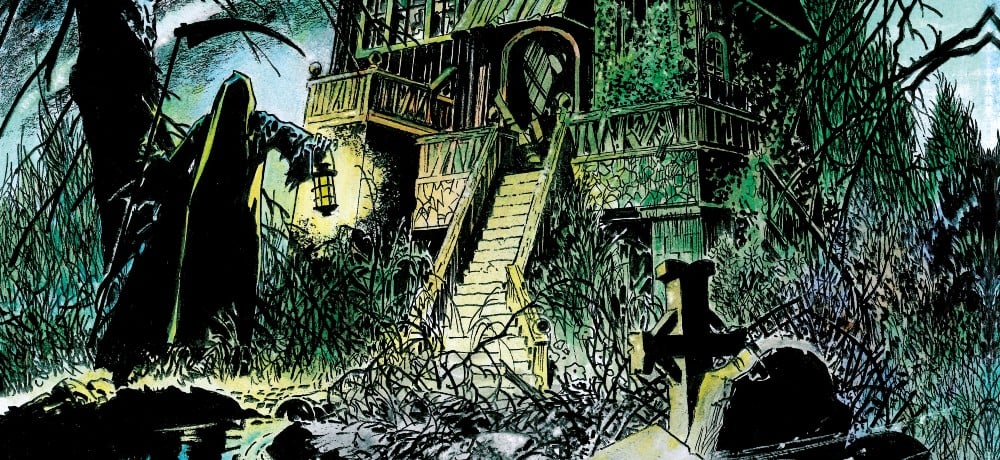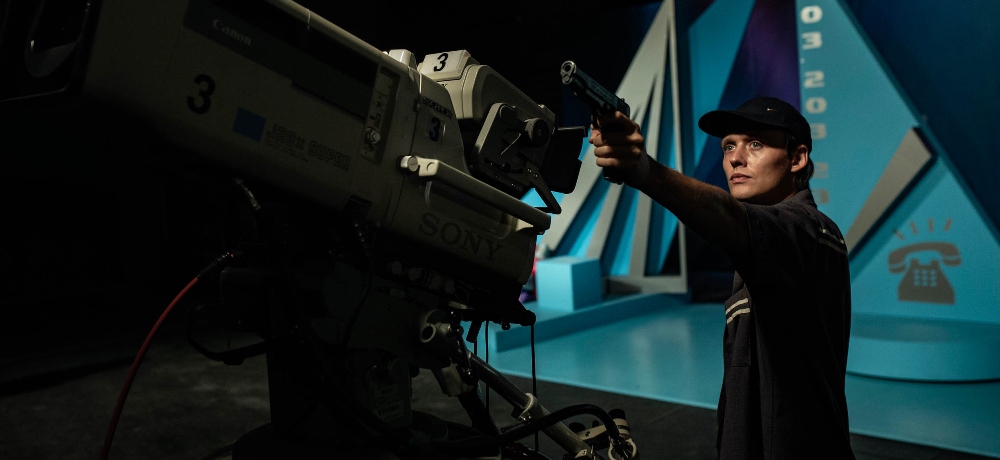






In 1999, Mira Kryle (Magdalena Popławska) runs to the studio; she's almost late. The presenter is supposed to conduct the TV contest on the occasion of New Year's Eve. The prize in the competition is quite something for the 1999/2000 year; it's the Matiz car, one of Poland's most popular vehicles at the time. The frivolous atmosphere swiftly transforms into something more ominous, and Mira wishes that she was late when Sebastian (Bartosz Bielenia) enters the place with a gun and takes Mira and a security guard, Grzegorz (Andrzej Kłak) hostage. Prime Time, directed by Jakub Piątek, is his directorial feature debut that premiered at the 2021 Sundance Film Festival. The film touches upon the issues of incompetence of those in charge in tough situations, mass media, and displays Poland's picture at the beginning of the new millennium.
Sebastian has only one demand; he wants to go live and talk to the audience across Poland. The police, as well as the publisher of the studio (Małgorzata Hajewska-Krzysztofik), are trying to stall time and stop him before he does it or kills one of the hostages. The negotiators (Cezary Kosiński and Monika Frajczyk) soon appear to prevent escalation, but do more to annoy than assist.
The moment Bielenia's Sebastian enters the studio, we want to know why. Why is this 22-year-old man so hurt that he needs to hurt others? But, as time passes, it becomes less about that and more about the connection between him, Mira, and Grzesiek, as well as about the picture of Poland in that time, police brutality, and people's incompetence in dealing with extreme situations.
From the moment of Prime Time's opening, we appreciate its production design that excellently captures the millennium's beginning. We can observe a perfectly prepared studio, just right for the television contest; pastel colors in a blue shade match Mira's pristine outfit. We see the old-timey cameras and lighting. All that wakes a special kind of nostalgia, especially for the viewers who were born and raised in Poland. But the atmosphere drastically changes after Sebastian's arrival. It's clear that it's the man's first time doing something so extreme. He sweats profusely and, at times, acts very confusing.
While Mira tries to soften the situation, everything worsens when the male negotiator takes the conversation into his hands. The man's annoying, too-polite-to-be-true conversation easily irritate Sebastian and the audience in front of the TVs. Time passes. Nothing moves forward until Mira tries to take the lead because she's sick and tired of the situation, only prolonged by the studio's executives, police, and the studio's president.

Bielenia is outstanding as Sebastian. The actor acts with every fiber of his being. We had a chance to see his phenomenal talent in Corpus Christi, and now, he only proves himself to be a terrific up-and-coming actor of the new generation. His portrayal of a lost young man in the world in which the new millennium commences and the revolution of technology and mass media begins is heartbreaking and notably gripping. As his life and past unravel, even the hostages bend and maybe even understand him deep down. Popławska keeps Bielenia's pace and, as a precocious, uptight studio presenter who thinks the world owes her, the actress showcases her acting range. Perhaps Popławska is not well known overseas; this role, however, will shine a light on her work.
But Piątek's narrative doesn't end there. In addition to the story of a man who breaks into a television studio and threatens people with a gun, there is also a picture of Poland at the turn of 1999 and 2000. The director and screenwriters (Jakub Piątek with Łukasz Czapski) chose this date for a reason. It may symbolize the beginning of the end for Sebastian. For others, it's a fresh start full of new chances. We can take note of small TVs on the set while main events are in play. It's not coincidental. Each exemplifies a different thing. The traditional New Year's Eve concert is in full swing. Maryla Rodowicz, a well-known Polish artist, performs on the stage as we can see her on a small glass screen, rounded at the edges.
We're not sure about the tone or lyrics, but perhaps she’s singing Ale to już było [eng: But those times are gone]. The chorus’ lyrics really suit Sebastian losing his grip in his current situation: But those times are gone and will never return. And though so much has happened, the foolish heart always keeps on racing. It's one of the songs the performer usually sings during yearly New Year's festivities, which makes the lyrics even more significant as we experience the main character spiraling. On the small TV, we can also see the President, Aleksander Kwaśniewski, giving his New Year's speech, and young people being interviewed. They express their desire to leave Poland.
These small scenes appearing in front of the audience have a deeper connection to Sebastian's character and what he's going through. In the beginning, he's sure of himself, sure of his demand and goal. But, as Prime Time goes on, the man loses touch with his primal goal. His new beginning becomes his demise.
The film's only stumble is that it loses its footing in some moments and prolongs the events on screen more than necessary. Other than that, Prime Time is a solid psychological thriller about a young man's exhaustion regarding the world's state and lack of communication between individuals.
Movie Score: 4/5
----------
Visit our online hub to catch up on all of our Sundance interviews and reviews!
[Photo Credit: Above photos courtesy of Tomek Kaczor/Sundance Institute.]